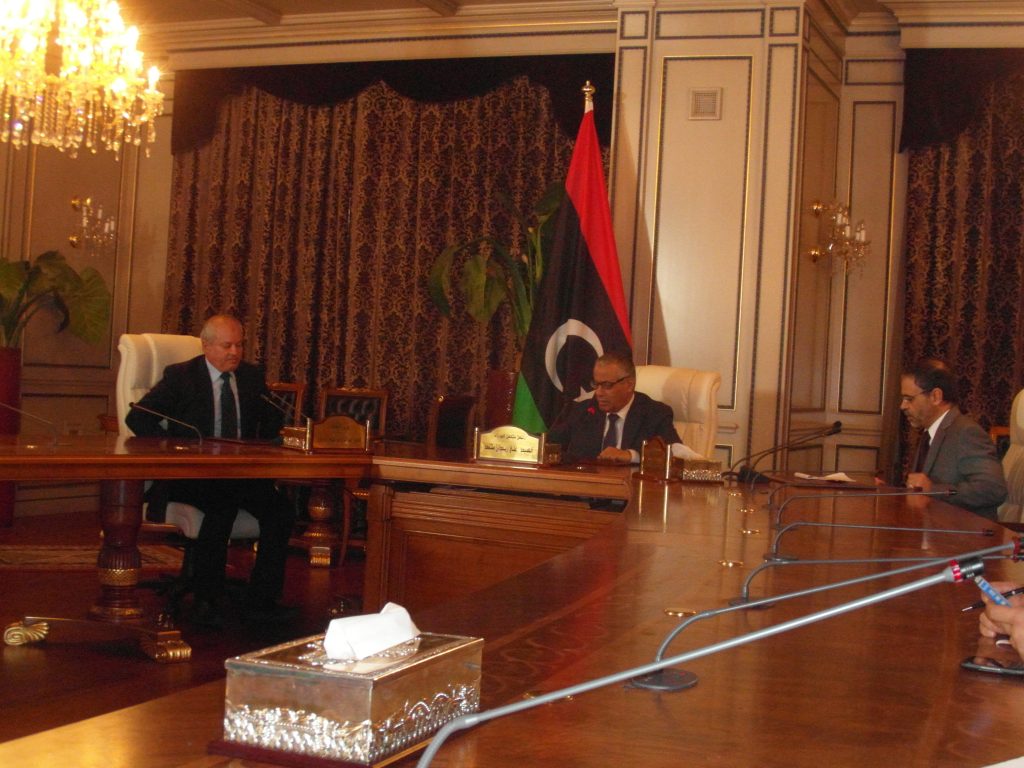
Electricity
Minister Ali Muhairig (right) blamed the Zueitina strikers for the
extended power cuts at Sunday’s press conference (Photo: Sami Zaptia).
Tripoli, 17 July 2013:
At Sunday’s press conference, Electricity Minister Ali Muhairig repeated his call for strikes that affect the national interest to be banned by law.
Muhairig said that there has been much criticism of him and his government for the long and frequent power cuts that have taken place all over Tripoli during Ramadan. Some areas in Janzur and Sug il Juma had experienced 12 and 24 hour power cuts during the opening days of the fasting month of Ramadan.
The Electricity Minister referring to his statements earlier in which he said “there should be little power cuts during Ramadan” reminded the public that he also set two conditions to that statement.
First, he said that provided temperatures remained below 40 degrees, and secondly, provided there were no strikes or acts of civil disobedience. But he also added that he was always expecting short power cuts of up to 2 hours in all areas in turn on a rotating basis.
Muhairig then set out to list five factors that have negatively affected the performance of the General Electricity Company of Libya (GECOL). These included strikes, the lack of security affecting foreign experts at power stations, the theft of public property (copper wires) by Libyans, the stealing of electricity by Libyans, and the non-payment of electricity bills by most of the public.
First, and in the short term, Muhairig blamed the lengthy power cuts in the opening days of Ramadan squarely on the 12-day striking Zueitina Oil Terminal workers.
The strike had led to a cut off of the supply of gas from Zueitina. The Minister explained that instead of receiving about 315 million cubic metres of gas, he was only receiving about half of that – about 140 million cubic metres.
This was leading to a 350 to 500 Mega Watt (MW) shortage. “We have generators and we are unable to use them fully”, complained the Electricity Minister.
Paradoxically, this has meant that the money the government had invested in importing mobile generators from American company APR was wasted, because the strike has cancelled their intended positive effect – it is as if Libya had not imported them, the Minister explained.
Secondly, Muhairig explained that there is a 250 MW generator in Zueitina that needs servicing. However, the German experts that were planned to maintain it have refused to travel to Libya in view of the recent armed attack on the Swiss firm ABB’s employee.
The same applied to the Kufra power station, Muhairig explained. The Italians that are supposed to provide the maintenance needed were unwilling to travel to Libya due to the poor security situation. The Electricity Minister added that the Kufra station has 3-6 days of fuel reserves – but not 12 days’ worth, which is the length of the Zueitina strike.
The fourth reason given by the Electricity Minister for the poor performance of GECOL was the “tens of millions” worth of robbery by Libyans of the company’s copper cables and transformers. The cables were being pulled out of the ground and towers were being chopped down in order to melt-down and export the copper he explained.
The fifth reason for the poor performance by GECOL given by the Electricity Minister was the fact that the overwhelming majority Libyans are still not paying their electricity bills. Whilst 2011 was written off by the state due to the Revolution, in 2012, only 5 percent of users paid their electricity bill.
The Minister did not have an exact number for 2013 but said only a few users had paid their bills.
Muhairig said that the total debts for GECOL/Ministry of Electricity were LD 4 bn and explained that the LD 2 bn allocated in the 2013 budget was used exclusively to pay for the fuel for the electricity subsidy. “We get nothing from it”, stressed the Minister.
With regards to public criticism as to why the Ministry did not build power stations, the Electricity Minister said that power stations need at least two years to build and that his Ministry only received its budget in May.
Rounding up the status of the imported APR power stations, Muhairig said that the Furnaj units were working and online, as well as the Zliten units. He expected the Khoms units to start work in a couple of days and the Samnu units in the south of Libya to go online by Thursday or Friday.
However, he reiterated that with the Zueitina strike, this would cancel out the effects of the import of all the mobile power generators.
Regarding the stations at Bir Sta Milad and Umm Jdawal, the Minister said that work was continuing 24 hours per day. Muhairig stressed that the powers cuts in Libya were only serious in the west of Libya. The east has excess capacity he said which was being transferred to the west.
Finally, Electricity Minister Muhairig said that he expected electricity supply to improve by mid Ramadan (July 24th). He reminded the public that they did not pay for their electricity, yet they “could not stand two hours of power cuts”. You must sacrifice for your nation, he added. “Don’t ask for the impossible, because we cannot provide the impossible”, he concluded his lengthy statement.
ليست هناك تعليقات:
إرسال تعليق